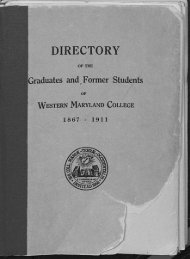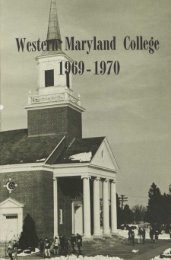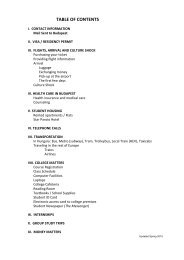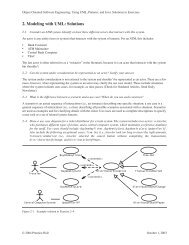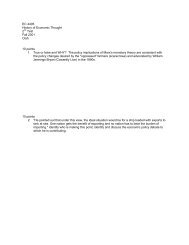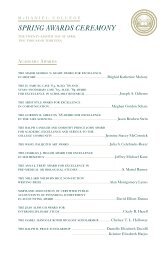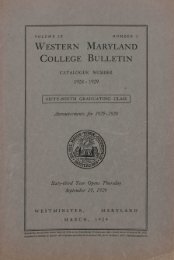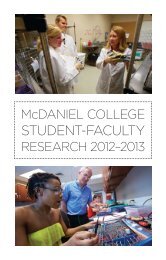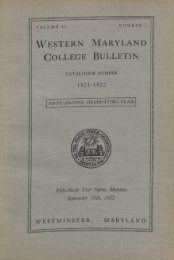The Hill, 2008 - Hoover Library - McDaniel College
The Hill, 2008 - Hoover Library - McDaniel College
The Hill, 2008 - Hoover Library - McDaniel College
Create successful ePaper yourself
Turn your PDF publications into a flip-book with our unique Google optimized e-Paper software.
insights__celebrating<br />
the "aha!" in learning<br />
A Capital Idea That Just<br />
Might Take Root<br />
BY KIM ASCH<br />
"If we can grow food on the roof of a bus<br />
going 60 mph down the highway, then the<br />
president can do it in his backyard."<br />
That's Casey Cusrowarow '02 talking from the<br />
souped-up school bus that has become home to him<br />
and his Peace Corps pal, Daniel Bowman Simon.<br />
Since August they've zig-zagged across the country,<br />
logging thousands of miles while growing broccoli,<br />
salad greens, beets and other vegetables on their rooftop<br />
garden. At each stop, they visit schools, food<br />
pantries, farmers' markets and festivals to sow the<br />
seeds of a grassroots movement, dubbed <strong>The</strong> Who-<br />
Farm, or <strong>The</strong> White House Organic Farm Project.<br />
"<strong>The</strong> Who Farm is a nonpartisan, petition-based initiative<br />
to respectfully request that our 44th president<br />
oversee the planting an organic farm on the grounds<br />
of<br />
of the White House," Gustowarow says by phone during<br />
a stop in Austin, Texas, five weeks before election<br />
day. "We're trying to inspire our next leader, be it a<br />
Democrat or a Republican, to lead by example when it<br />
comes to changing the way this country eats."<br />
And change is required, Gustowarow says. <strong>The</strong> current<br />
system exacts too heavy a toll on the environment,<br />
dependence on pesticides and fertilizers for<br />
with its<br />
production and on fossil fuel for distribution. Rising<br />
childhood-obesity rates indicate an abundance of<br />
cheap calories, not necessarily nutritious foods.<br />
but<br />
And incidents of contamination pose even more immediate<br />
threats to the nation's health.<br />
"Local organic farming is a critical element to sustainable<br />
healthy living, food security, youth education<br />
and climate-change mitigation," he concludes. "<strong>The</strong><br />
White House Organic Farm will reconnect the office of<br />
the presidency to the self-sufficient agricultural roots<br />
of America's founding fathers."<br />
<strong>The</strong>re is precedent for their request, Gustowarow<br />
points out. When John Adams took up residence in the<br />
White House in 1800, one of his first additions was a<br />
vegetable garden. Eleanor Roosevelt in 1943 helped<br />
start a Victory Garden movement to reduce the pressure<br />
o~.the public food supply during World War II.<br />
I~ addition to the White House garden, nearly 20 milhan<br />
Americans planted gardens in their own backyar~s<br />
and on the rooftops of apartment buildings, produ~mg<br />
up to 40 percent of all the vegetables consumed<br />
nationally.<br />
Gustowarow, a biology major, says he would like to<br />
see similar momentum for <strong>The</strong> WhoFarm project. He<br />
has worked in coastal resource management as a Peace<br />
Corps volunteer in the Philippines and on the Ivy<br />
~rand Organic Farm in Maryland. He's also taught part<br />
time at <strong>McDaniel</strong> and led a Jan Term course in the<br />
Cas€yGustowarow'02is<br />
trovelinglhenutiorli,la<br />
<strong>The</strong><br />
<strong>Hill</strong>



